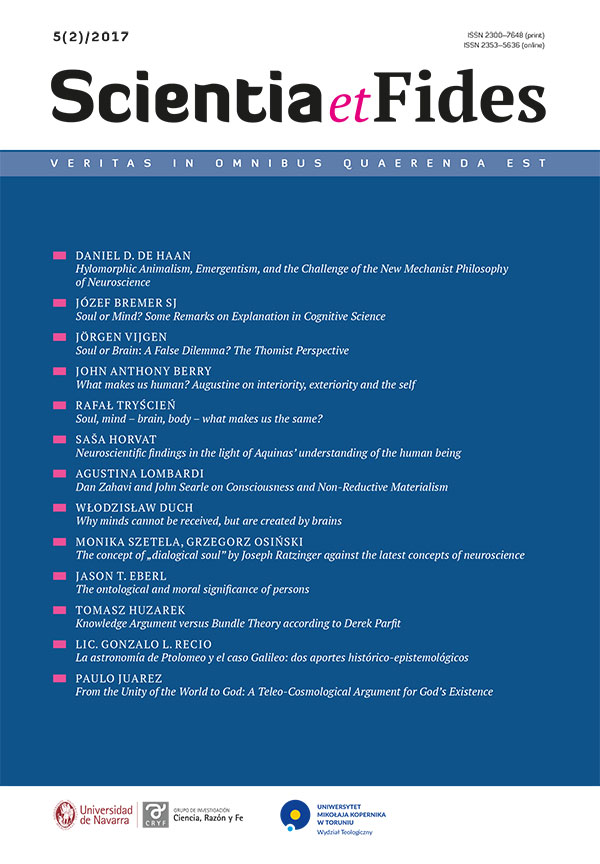Dan Zahavi and John Searle on Consciousness and Non-Reductive Materialism
Keywords
consciousness, mind, dualismAbstract
In his 1994 paper, neuroscientist Benjamin Libet affirmed that he found a way to test the interaction between the mind and the brain. He believed that this procedure would also test the reality of a non-physical mind, emerging from neural activity. In 2000 John Searle objected to Libet’s evident dualism, affirming that the mind is not a hypothesis to test but a datum to be explained. According to Searle, Libet’s problem arose from accepting the Cartesian distinction of ‘mind’ and ‘body’, obsolete categories from an old philosophy. Searle’s solution implied the rejection both of dualism and reductive materialism, suggesting a non-reductive materialism. This first-person ontology, as Searle calls it, aims at preserving, against reductive materialism, the essential features of consciousness, i.e. subjective, qualitative and unified. Searle argued, however, that the nature of consciousness remained biological. Dan Zahavi’s thesis is that a phenomenological approach to the self and consciousness can offer a complementing alternative to the contemporary comprehension of the nature of consciousness. Engaged in an open dialogue with neuroscience and cognitive science in his dealings with consciousness, Zahavi holds, nonetheless, that this notion cannot be completely understood without reference to the notion of the self. Thus, this paper will analyse Zahavi’s ideas about the self and consciousness in Subjectivity and Selfhood (2005) as to evaluate whether his phenomenological approach is able to overcome the materialist tones of Searle’s philosophy of mind, opening the possibility of a non-reductive comprehension of human beings.
References
Gallagher, S., & Zahavi, D. 2008. The Phenomenological Mind. An Introduction to Philosophy of Mind and Cognitive Science. New York: Routledge.
Libet, B. 1994. “A Testable Field Theory of Mind-Brain Interaction.” Journal of Consciousness Studies 1(1):119–126.
Libet, B. 2001. “‘Consciousness, Free Action and the Brain’. Commentary on John Searle’s Article (with a short reply from John R. Searle).” Journal of Consciousness Studies 8, 8:59–65.
Rosenthal, D. 1993. “Higher-order Thoughts and the Appendage Theory of Consciousness.” Philosophical Psychology 6:155–166.
Searle, J. 1984. Mind, Brains and Science. Cambridge-Ma: Harvard University Press.
Searle, J. 1992. The Rediscovery of the Mind. Cambridge-Ma: The MIT Press.
Searle, J. 2000. “Consciousness, Free Action and the Brain.” Journal of Consciousness Studies 7, 10:3–22.
Searle, J. 2001. “‘Further Reply to Libet’. In Libet, B. ‘Consciousness, Free Action and the Brain’. Commentary on John Searle’s Article.” Journal of Consciousness Studies 8, 8:63–65.
Searle, J. 2001/2002. “Neither Phenomenological Description Nor Rational Desconstruction: Reply to Dreyfus.” Revue internationale de philosophie 216:277–297.
Searle, J. 2004. Mind: A Brief Introduction. New York: Oxford University Press.
Zahavi, D. 2002. “First-person thoughts and embodied self-awareness: Some reflections on the relation between recent analytical philosophy and phenomenology.” Phenomenology and the Cognitive Sciences 1:7–26.
Zahavi, D. 2004. “Introduction: Subjectivity in the Center or Back to Basics.” Phenomenology and the Cognitive Sciences 3:229–234.
Zahavi, D. 2005. Subjectivity and Selfhood. Investigating the First-Person Perspective. Massachusetts: The MIT Press.
Downloads
Published
How to Cite
Issue
Section
License
CC BY ND 4.0. The Creator/Contributor is the Licensor, who grants the Licensee a non-exclusive license to use the Work on the fields indicated in the License Agreement.
- The Licensor grants the Licensee a non-exclusive license to use the Work/related rights item specified in § 1 within the following fields: a) recording of Work/related rights item; b) reproduction (multiplication) of Work/related rights item in print and digital technology (e-book, audiobook); c) placing the copies of the multiplied Work/related rights item on the market; d) entering the Work/related rights item to computer memory; e) distribution of the work in electronic version in the open access form on the basis of Creative Commons license (CC BY-ND 3.0) via the digital platform of the Nicolaus Copernicus University Press and file repository of the Nicolaus Copernicus University.
- Usage of the recorded Work by the Licensee within the above fields is not restricted by time, numbers or territory.
- The Licensor grants the license for the Work/related rights item to the Licensee free of charge and for an unspecified period of time.
FULL TEXT License Agreement
Stats
Number of views and downloads: 613
Number of citations: 0



